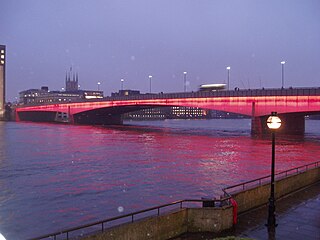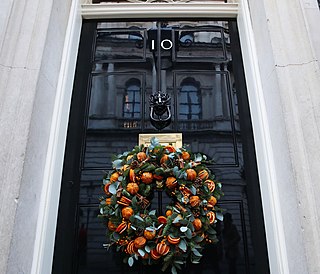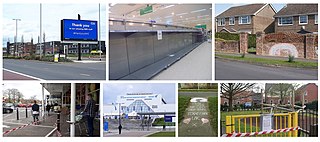Related Research Articles

Prince Philip, Duke of Edinburgh is a member of the British royal family as the husband of Queen Elizabeth II.

A speech from the throne is an event in certain monarchies in which the reigning sovereign, or a representative thereof, reads a prepared speech to members of the nation’s legislature when a session is opened, outlining the government’s agenda and focus for the forthcoming session; or—in some cases—closed. When a session is opened, the address sets forth the government’s priorities with respect to its legislative agenda, for which the cooperation of the legislature is sought. The speech is often accompanied with formal ceremony and is often held annually, although in some places it may occur more or less frequently, whenever a new session of the legislature is opened.

The Queen's Official Birthday, or the King's Official Birthday, is the selected day in some Commonwealth realms on which the birthday of the monarch is officially celebrated in those countries. It does not necessarily correspond to the date of the monarch's actual birth.

The Head of the Commonwealth is the "symbol of the free association of independent member nations" of the Commonwealth of Nations, an intergovernmental organisation that currently comprises 54 sovereign states. There is no set term of office or term limit and the role itself involves no part in the day-to-day governance of any of the member states within the Commonwealth.

The Queen's Christmas Message is a broadcast made by the sovereign of the Commonwealth realms to the Commonwealth of Nations each Christmas. The tradition began in 1932 with a radio broadcast by King George V on the British Broadcasting Corporation's Empire Service. Since 1952, the message has been read by Elizabeth II; today, it is broadcast on television, radio, and the Internet via various providers.
Events from the year 1952 in the United Kingdom. This year sees a change of monarch.

The image of Queen Elizabeth II has been generally favourable throughout the years. Conservative in dress, she is well known for her solid-colour overcoats and matching hats which allow her to be seen easily in a crowd. She attends many cultural events as part of her public role. Her main leisure interests include horse racing, photography, and dogs, especially her Pembroke Welsh corgis. Her views on political issues and other matters are largely subject to conjecture. She has never given a press interview and is otherwise not known to discuss her personal opinions publicly.

Elizabeth II is Queen of the United Kingdom and 15 other Commonwealth realms.
The alternative Christmas message is a message broadcast by Channel 4 since 1993, as a sometimes humorous and sometimes serious alternative to the Royal Christmas Message of Queen Elizabeth II.

The year 2012 marked the Diamond Jubilee of Elizabeth II being the 60th anniversary of the accession of Queen Elizabeth II on 6 February 1952. The only Diamond Jubilee celebration for any of Elizabeth's predecessors was in 1897, for the 60th anniversary of the 1837 accession of Queen Victoria.

Royal Family is a British television documentary about the family of Queen Elizabeth II. It originally aired on BBC 1 and ITV in June 1969. The film attracted over 30 million viewers in the United Kingdom, and was sold around the world and seen by an estimated 350 million people. The Queen later had the documentary banned; it has not been shown on British TV since 1977, and access to view the film by researchers was heavily restricted. In early 2021 it was leaked and published on the internet. The film remains available to view on the video-sharing platform Vimeo.

Prince George of Cambridge is a member of the British royal family. He is the eldest child of Prince William, Duke of Cambridge, and Catherine, Duchess of Cambridge, and third in the line of succession to the British throne behind his grandfather Prince Charles and his father. As he is expected to become king one day, his birth was widely celebrated across the Commonwealth realms. George occasionally accompanies his parents on royal tours and engagements, and has affected business and popular culture.

Operation London Bridge is a codename that refers to the plan for what will happen in the days after the death of Queen Elizabeth II of the United Kingdom and the other Commonwealth realms. The plan was originally devised in the 1960s and is updated several times each year. It involves planning from government departments, the Church of England, Metropolitan Police Service, the British Armed Forces, the media, the Royal Parks, London boroughs, the Greater London Authority and Transport for London. Some critical decisions relating to the plan were made by the Queen herself, although some can only be made by her successor, after her death.

The Prime Minister's New Year Message in the United Kingdom is an annual speech made by the Prime Minister for the start of a new year. It is traditionally released around New Year's Eve and Hogmanay throughout Britain, consisting of a speech which is a few minutes long and usually contains reflections on what has taken place throughout the previous year. This is then followed by a government-backed preview of what can be expected in the coming new year and the current political state of the nation. Beyond politics, the message also includes sentiments and achievements from throughout the year, and national events that have taken place.

The COVID-19 pandemic in the United Kingdom is part of the worldwide pandemic of coronavirus disease 2019 caused by severe acute respiratory syndrome coronavirus 2. The virus reached the country in late January 2020. As of 25 February 2021, there have been 4,154,562 confirmed cases and 122,070 deaths, the world's fourth-highest death rate per hundred thousand population and the highest number overall in Europe. There were 135,694 deaths where the death certificate mentioned COVID-19 by 12 February 2021. There has been some disparity between the outbreak's severity in each of the four nations. Health in the United Kingdom is a devolved matter, with England, Northern Ireland, Scotland and Wales each having their own systems of publicly funded healthcare, separate governments and parliaments, together with smaller private sector and voluntary provision.

The COVID-19 pandemic was first confirmed to have spread to England with two cases among Chinese nationals staying in a hotel in York on 31 January 2020. The two main public bodies responsible for health in England are NHS England and Public Health England. NHS England oversees the budget, planning, delivery and day-to-day operation of the commissioning side of the NHS in England while PHE's mission is "to protect and improve the nation’s health and to address inequalities". As of 13 February 2021, there have been 3,528,695 total cases and 103,106 deaths in England. In January 2021 it was estimated around 22% of people in England have had coronavirus.

Her Majesty's Government responded to the COVID-19 pandemic in the United Kingdom in various ways. Because of devolution, following the arrival of coronavirus disease 2019 on 31 January 2020, the different home nations' administrative responses to the pandemic have been different to one another; the Scottish Government, the Welsh Government, and the Northern Ireland Executive have produced different policies to those that apply in England. The National Health Service is the publicly funded healthcare system of Britain, and has separate branches for each of its four nations.
A royal address is a public speech by a monarch or member of a royal family. This may refer to:

The COVID-19 pandemic in the United Kingdom has had far-reaching consequences in the country that go beyond the spread of the disease itself and efforts to quarantine it, including political, cultural, and social implications.

The Platinum Jubilee of Elizabeth II is expected to be celebrated in June 2022 in the United Kingdom and the Commonwealth to mark the 70th anniversary of the accession of Queen Elizabeth II on 6 February 1952. In the United Kingdom, an extra bank holiday will be created and the traditional May bank holiday weekend will be moved to the start of June, to create a special four-day Jubilee weekend. The British government has promised a 'once-in-a-generation show' that will "mix the best of British ceremonial splendour and pageantry with cutting edge artistic and technological displays". So long as Queen Elizabeth remains on the throne until 6 February 2022, this will be the first time any British monarch has celebrated a platinum jubilee.
References
- ↑ Caroline Davies (3 April 2020). "Queen to address nation on Sunday over coronavirus crisis". The Guardian. Retrieved 5 April 2020.
- 1 2 3 Chris Ship (3 April 2020). "What is the significance of the Queen's special address to the nation during the coronavirus crisis?". ITV News. Retrieved 5 April 2020.
- ↑ Owens, Edward (15 October 2018). The Family Firm: Monarchy, Mass Media and the British Public, 1932-53. University of London Press. p. 420. ISBN 9781909646988.
- ↑ "A speech by The Queen on her Coronation Day, 1953 ; The Royal Family". Royal.uk.
- ↑ Bousfield, Arthur; Toffoli, Garry (2002). Fifty Years the Queen: A Tribute to Her Majesty Queen Elizabeth II on Her Golden Jubilee. Dundurn. ISBN 9781550023602.
- 1 2 "Queen hopes for a lasting peace". The Times. 25 February 1991. p. 5. Retrieved 3 April 2020– via The Times Digital Archive.
- 1 2 Sally Bedell Smith (2 February 2012). Elizabeth the Queen: The real story behind The Crown. Penguin Books Limited. p. 479. ISBN 978-0-14-197333-3.
- 1 2 Andrew Rawnsley (16 July 2001). Servants of the People: The Inside Story of New Labour. Penguin Adult. p. 103. ISBN 978-0-14-027850-7.
- ↑ Sarah Bradford (5 July 2007). Diana. Penguin Books Limited. p. 29. ISBN 978-0-14-190673-7.
- ↑ "Queen Broadcasts Live to Nation". BBC News. 5 September 1997. Retrieved 5 April 2020.
- ↑ Julia Kinzler (27 July 2018). Representing Royalty: British Monarchs in Contemporary Cinema, 1994-2010. Cambridge Scholars Publishing. p. 251. ISBN 978-1-5275-1496-6.
- ↑ "Queen's tribute: Full text". CNN. 8 April 2002. Archived from the original on 5 April 2020. Retrieved 5 April 2020.
- ↑ "The Queen's broadcast to the Armed Forces, 1 July 2009". Royal.uk. 1 July 2009. Retrieved 16 February 2021.
- ↑ "New Queen's award for forces dead". BBC. 1 July 2009. Retrieved 16 February 2021.
- ↑ "The Queen's Diamond Jubilee Message". Royal.uk. 5 June 2012. Retrieved 31 January 2021.
- ↑ "The Queen tours New Broadcasting House". Radio Today UK. 9 June 2013. Retrieved 30 January 2021.
- ↑ "The Queen officially opens BBC's new Broadcasting House". The Guardian. 7 June 2013. Retrieved 30 January 2021.
- ↑ "A speech by The Queen to open the new BBC Broadcasting House". Royal.uk. 7 June 2013. Retrieved 30 January 2021.
- ↑ "Queen Elizabeth brings BBC news to a halt". Business Standard. 7 June 2013. Retrieved 30 January 2021.
- ↑ "Queen officially opens BBC's new Broadcasting House building". BBC News. 7 June 2013. Retrieved 30 January 2021.
- ↑ "A message from The Queen to the people of Canada". Royal.uk. 1 January 2017. Retrieved 16 February 2021.
- ↑ "The Queen sends message of 'hope and light' on Easter Sunday - CBBC Newsround" . Retrieved 2020-06-10.
- ↑ Hallemann, Caroline (2020-04-11). "Queen Elizabeth Records Her First-Ever Easter Message of Hope Amid the Coronavirus Pandemic". Town & Country. Retrieved 2020-06-10.
- ↑ "Queen to lead 75th VE Day anniversary events". BBC News. 29 April 2020. Retrieved 29 April 2020.
- ↑ "Streets not empty as filled with love, says Queen". BBC News. 8 May 2020. Retrieved 8 May 2020.
